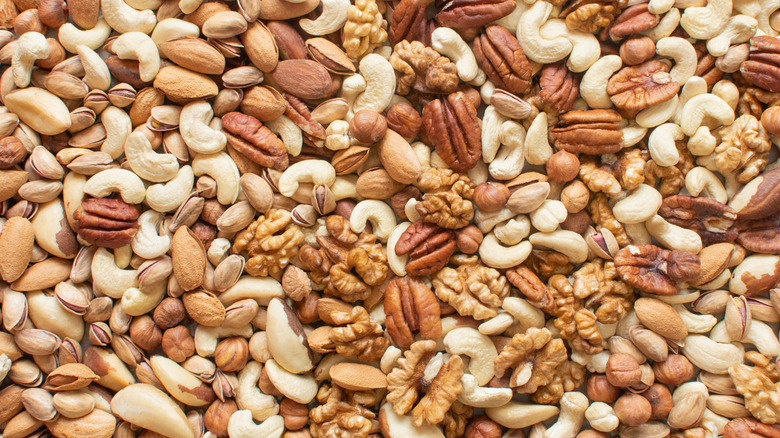The Nutty Ingredient That Packs More Protein Than An Egg
The importance of protein for the human body cannot be understated; we rely on this macronutrient for energy, for metabolic support, and to help keep us full between meals. While protein has become a bit of a marketing buzzword in the 2020s, its popularity doesn't make it any less significant for everyday diets. For many people, that means starting their day with an egg, considered the gold standard of protein. However, there is a nuttier alternative to eggs that contains even more of the vital macronutrient: peanuts.
While an egg contains over 6 grams of protein, peanuts — which are actually not technically nuts, but are instead legumes (think peas and beans), which form and grow underground — contain 7 grams of protein per 1-ounce serving (which equates to about a fourth of a cup). What's more, peanuts are a lot easier to keep on hand, thanks to the fact that they don't require refrigeration, and they're shelf-stable (if stored in an airtight container). They actually contain 2 grams of fiber per serving, too, which, along with their protein, can help keep you feeling fuller longer. Plus, they're super versatile as add-ons; they taste great on ice cream, as a topping on a homemade grilled shrimp pad thai recipe, or in a sesame-peanut tempeh bowl.
Other nuts with protein comparable to an egg
Peanuts aren't the only nuts that come close to the protein content, per serving, of an egg. You can get a similar amount of the macronutrient by consuming a single ounce of pistachios, too. Not only are they a protein powerhouse, a serving contains almost 10% of your daily value of potassium, and they have even more fiber than peanuts, clocking in at 3 grams. Plus, pistachios house all of the amino acids that are essential to human bodies.
Another nut that's on par with eggs, almonds also contain 6 grams of protein per 1-ounce serving, but they're also jam-packed with other nutrients that help elevate these crunchy snacks. They have more fiber than both peanuts and pistachios (at 3.5 grams), and they're also a good source of heart-friendly antioxidants. Further, these nuts contain the most calcium and vitamin E out of all the nuts around.
For lesser — but still significant, considering the size of the serving — amounts of protein, you could also work cashews and walnuts into your everyday diet. Both contain 4 grams of protein per one-fourth of a cup, or one ounce. They're widely available and are both marked by their creamy flavor if you prefer that to the earthiness of peanuts or almonds.


